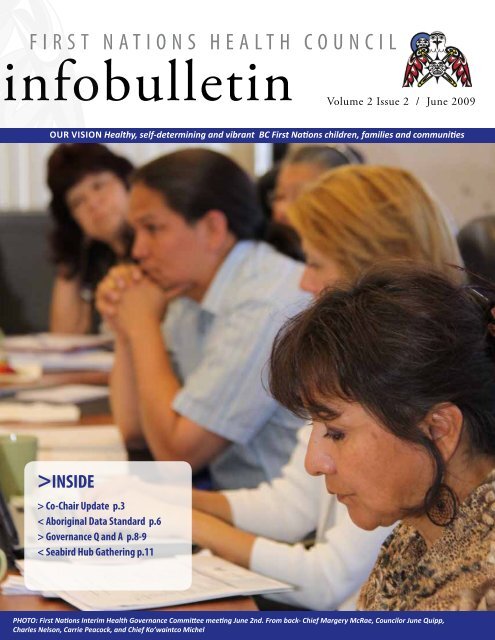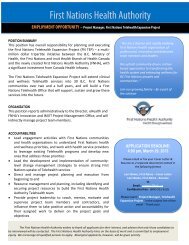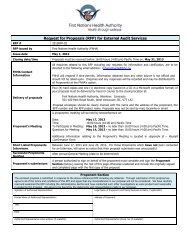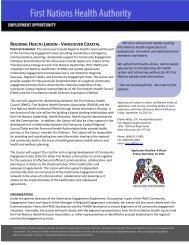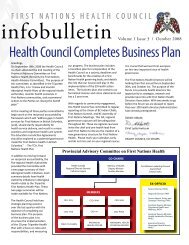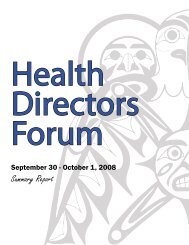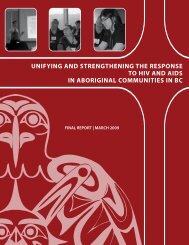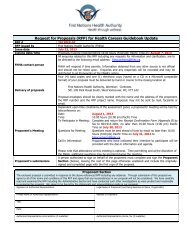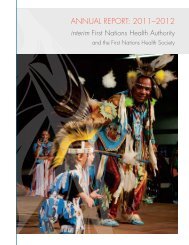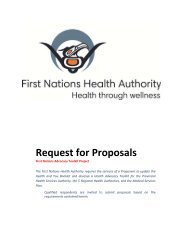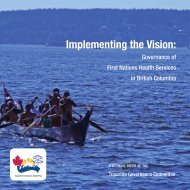June 2009 - First Nations Health Council
June 2009 - First Nations Health Council
June 2009 - First Nations Health Council
You also want an ePaper? Increase the reach of your titles
YUMPU automatically turns print PDFs into web optimized ePapers that Google loves.
<strong>First</strong> <strong>Nations</strong> <strong>Health</strong> <strong>Council</strong> | <strong>June</strong> <strong>2009</strong> Infobulletin | page 6NEWS IN BRIEFThe Aboriginal Administrative Data StandardAre you <strong>First</strong> <strong>Nations</strong>? Status or non-Status?Aboriginal? Métis?Depending on the government agency thatyou are interacting with you might face one orall of the above questions. That’s because inBC, we have been collecting aboriginal data innon-standard ways.As a result of the numerous ways that thisquestion is asked, and the ways that respectivegovernment agencies store the answers tothis question, we currently do not have a clearoverall socio-economic picture of the lives ofBC Aboriginal Peoples.The Ministry of Aboriginal Relations andReconciliation (MARR) is in the preliminarystages of implementing a data standard acrossall government agencies which will standardizethe self-identification of Aboriginal people inBC. The first government agency in the <strong>Health</strong>Sector to implement the standard will beBC Vital statistics, who will plans to roll outthe initiative later this year. The ministriesof Housing and Social Development andEducation have also begun to implementCommunity Nutrition Needs and Assets Assessmentthe Standard. Eventually all governmentministries will implement the standard.The Transformative Change Accord andthe <strong>First</strong> <strong>Nations</strong> <strong>Health</strong> Plan includecommitments to bridge socio-economic gapsfor aboriginal people. Without standarddata, results cannot be appropriatelymeasured. As a result the <strong>Health</strong> <strong>Council</strong>is supporting the implementation of thisdata standard, and is providing support andadvice to MARR and the Ministries of <strong>Health</strong>to ensure that the implementation of theStandard respects Aboriginal people’s privacyand rights.“There is a long history of exploitation ofdata on <strong>First</strong> <strong>Nations</strong> people that we mustcontend with.” Comments Michelle DeGrootVP of <strong>Health</strong> Policy and Advocacy, “We areinvolved because increasing the accuracyof data collected will provide <strong>First</strong> <strong>Nations</strong>agencies and communities with moreaccurate decision-making tools. We knowthat if this is done properly <strong>First</strong> <strong>Nations</strong> willbe more comfortable with the process fromthe outset.”Thank you to everyone who completed the Community Nutrition Needs and AssetsAssessment (CNNAA). The results of this survey have been compiled and presentedin a report to community. The CNNAA identified thefollowing priorities for community nutrition:1. Training priorities include those that increasecommunity capacity to address food security, healthymeal planning for cooks and build traditional foodknowledge and skill.2. Communities would like support and training in foodpolicy development.3. There is a need for part-time community basedhealth promoters with a nutrition focus.To view a copy of the report, please visit the nutrition page of the FNHC Website orcontact Nutritionist Suzanne Johnson. Hard copies of the report can be mailed out atindividual request and will also be available at upcoming <strong>Health</strong> <strong>Council</strong> gatherings.Suzanne Johnson, RDFNHC Nutritionist<strong>Health</strong> Directors AssociationGratitude is extended to the BC <strong>First</strong> <strong>Nations</strong>health director’s sub-committee. Theirguidance is appreciated as they developpreliminary considerations for a structure toestablish the <strong>First</strong> <strong>Nations</strong> <strong>Health</strong> Director’sAssociation.Acting on input provided by BC <strong>First</strong> <strong>Nations</strong>health directors at the <strong>Health</strong> DirectorsForum 2007, Interior <strong>Health</strong> Conference2007 and <strong>Health</strong> Directors Forum 2008, thesteering committee is developing a potentialmodel for ratification.The <strong>First</strong> <strong>Nations</strong> <strong>Health</strong> <strong>Council</strong> supportsthe establishment of this Association byproviding a <strong>Health</strong> Director Coordinator,technical support and expertise, and travelfor <strong>Health</strong> Directors and sub-committeemembers to forums for development ofthe potential model. The <strong>First</strong> <strong>Nations</strong><strong>Health</strong> <strong>Council</strong> will provide these supportsat upcoming Gathering Wisdom III, so thathealth directors are given opportunity toratify the sub-committee’s model structure.The sub-committee welcomes theinvolvement from BC <strong>First</strong> <strong>Nations</strong> healthdirectors to carry the process forward.If you would like to be a part of the subcommitteeor require information onthe <strong>Health</strong> Directors Association pleasecontact: Marilyn Ota, VP <strong>Health</strong> Planning604.913.2080 / mota@fnhc.caBursary & Scholarhip initiatives-deadline ExtendedThe deadline for <strong>First</strong> <strong>Nations</strong> <strong>Health</strong> <strong>Council</strong>bursary and scholarships initiative has been extendedto <strong>June</strong> 26th, <strong>2009</strong>. The purpose of theBursary & Scholarship Initiatives is to encourageAboriginal students pursuing educationalopportunities leading to careers in healthprofessions.- Bursary initiative - maximum $3500 per year- Scholarship initiative -maximum $2000 peryearTo apply please visit: http://www.fnhc.ca/index.php/initiatives/building_health_professions/health_careers/
<strong>First</strong> <strong>Nations</strong> <strong>Health</strong> <strong>Council</strong> | <strong>June</strong> <strong>2009</strong> Infobulletin | page 8Frequently Asked Questions- GovernanceWhat is <strong>Health</strong> Governance?In the context of the Transformative Change Accord:<strong>First</strong> <strong>Nations</strong> <strong>Health</strong> Plan and the Tripartite <strong>First</strong> <strong>Nations</strong><strong>Health</strong> Plan, health governance is a new administrativearrangement with <strong>First</strong> <strong>Nations</strong> and Inuit <strong>Health</strong> to ensurethe availability of, or access to, health services for <strong>First</strong><strong>Nations</strong> communities.<strong>First</strong> <strong>Nations</strong> and Inuit <strong>Health</strong> basically manages essentialhealth programs and service delivery in an effort to supportaction on health status inequalities.<strong>First</strong> <strong>Nations</strong> and Inuit <strong>Health</strong> are prepared to devolvehealth resources to BC <strong>First</strong> <strong>Nations</strong> control as set out in theTripartite <strong>First</strong> <strong>Nations</strong> <strong>Health</strong> Plan and the TransformativeChange Accord providing a framework.There is an exciting opportunity for B.C. <strong>First</strong> <strong>Nations</strong> tohave full authority to enact policies, measure success,allocate resources, establish service standards that areaccountable, and develop a governance framework thatuniquely reflects the cultures of B.C. <strong>First</strong> <strong>Nations</strong>.GeneralWill the <strong>First</strong> <strong>Nations</strong> <strong>Health</strong><strong>Council</strong> be another level ofbureaucracy between communitiesand federal funding?The goal of the <strong>First</strong> <strong>Nations</strong><strong>Health</strong> <strong>Council</strong> is to limit the levelof bureaucracy between BC <strong>First</strong><strong>Nations</strong> and federal funding. TheTripartite <strong>First</strong> <strong>Nations</strong> <strong>Health</strong> Planidentifies key areas of developmentthat will limit bureaucracythrough a new health governanceframework: <strong>First</strong> <strong>Nations</strong> <strong>Health</strong><strong>Council</strong>, Aboriginal physician toadvise on Aboriginal issues, <strong>First</strong><strong>Nations</strong> <strong>Health</strong> Advisory Committee,province-wide <strong>Health</strong>Partners Group and a reciprocalaccountability framework to addressgaps in health services for<strong>First</strong> <strong>Nations</strong> in B.C.What are some incentives toparticipate?• <strong>First</strong> <strong>Nations</strong> control overtheir own health administrativeprocess.• Limit bureaucracy with thegoal to have funding go directlyto BC <strong>First</strong> <strong>Nations</strong>.• BC <strong>First</strong> <strong>Nations</strong> to developcommunity driven programsto help deal with their ownhealth problems.• A better health care systemthat meets individual needs,long term community healthgoals and is underpinned bythe unique cultural systems ofBC <strong>First</strong> <strong>Nations</strong>.Regional Caucus ProcessHow can communities andindividuals be involved in thecaucus process?Individuals from B.C. <strong>First</strong> <strong>Nations</strong>have an opportunity to provideinput on concerns of healthgovernance through the regionalcaucuses that will be establishedand maintained by a <strong>First</strong> <strong>Nations</strong>Interim <strong>Health</strong> Governance Committeerepresentative(s).Q. Will there be involvementfrom communities on theboard, setting up structure, informing the society?A. The <strong>First</strong> <strong>Nations</strong> <strong>Health</strong> <strong>Council</strong>has supported Regional CaucusSessions to foster communitydrivencreation of Regional Caucusstructures, memberships andrepresentation. These Regionalbodies will inform the <strong>First</strong><strong>Nations</strong> Interim <strong>Health</strong> GovernanceCommittee’s negotiationsmandate.Q. Do we know that we areentering negotiations withHC people who will be able tomake decisions and not haveto go back to Ottawa to check?How does FNIH pacific region fitinto the national context?A. <strong>Health</strong> Canada, <strong>First</strong> <strong>Nations</strong>and Inuit <strong>Health</strong>, has appointedIan Potter as Project Manager forthe tripartite negotiations. Potterreports to Anne-Marie Robinson,Assistant Deputy Minister of <strong>First</strong><strong>Nations</strong> and Inuit <strong>Health</strong>, and toMorris Rosenberg, the DeputyMinister for <strong>Health</strong> Canada.Although FNIH pacific region isdiscussing dissolving, this doesnot directly affect the continuedoperation of the other regionalbranches.C. Even by talking about electionsand nominations, (to theFNIHGC) it gives agreement– full consultation should havehappened before the three organizationssigned on, and thismust be addressed.A. This plan is an enabling documentthat supports the developmentof local health plans for allBC <strong>First</strong> <strong>Nations</strong> and recognizesthe fundamental importance ofcommunity solutions and approaches.The objectives detailedin the Tripartite <strong>First</strong> <strong>Nations</strong><strong>Health</strong> Plan are fully supportedand endorsed through formalresolutions at the <strong>First</strong> <strong>Nations</strong>Summit (Resolution #0307.07),the Union of BC Indian Chiefs(Resolution #2007-06), and the BCAssembly of <strong>First</strong> <strong>Nations</strong> (Resolution#7/2007). The Blueprint onAboriginal <strong>Health</strong> and various politicalprocesses with the Governmentof Canada, the Governmentof British Columbia, and since2005, the <strong>First</strong> <strong>Nations</strong> Leadership<strong>Council</strong>, precede the TransformativeChange Accord: <strong>First</strong> <strong>Nations</strong><strong>Health</strong> Plan and has establishedvarious processes for consultationwith BC <strong>First</strong> <strong>Nations</strong>.The <strong>First</strong> <strong>Nations</strong> <strong>Health</strong> <strong>Council</strong>is committed to supporting thedevelopment of a communitydrivennegotiations process. Themore involvement from eachcommunity, the more communityinformedthe process will become.The opportunities to get involvedare to raise concerns as a RegionalCaucus member, or to join a CommunityEngagement Hub to provideyour input into the process. AChecklist of community concernscoming out of the Regional GovernanceSessions has been startedfor each Regional Caucus toexpand upon. The Checklists willdirectly inform the <strong>First</strong> <strong>Nations</strong>Interim <strong>Health</strong> Governance Committeeat the negotiations table.
<strong>First</strong> <strong>Nations</strong> <strong>Health</strong> <strong>Council</strong> | <strong>June</strong> <strong>2009</strong> Infobulletin | page 9Your Governance Questions AnsweredFundingHow much funding will beavailable for a BC <strong>First</strong> <strong>Nations</strong>health governing body?managed by a Board of Directorsthat will work in collaborationwith the FNHS members and theSenior Management team todetermine work plans, timelinesand budgets.It is anticipated that the fundingarrangement with <strong>First</strong> <strong>Nations</strong>and Inuit <strong>Health</strong> will be similarto the funding that is currentlyavailable with additional costsof implementing a new healthgoverning body. The <strong>First</strong> <strong>Nations</strong>Interim <strong>Health</strong> Governance Committeewill create a meaningfuldialogue with each caucus todetermine a comprehensive negotiationsplan.Will the current fundingarrangements thatcommunities have withthe federal government beaffected?Current arrangements with <strong>First</strong><strong>Nations</strong> and Inuit <strong>Health</strong> and B.C.<strong>First</strong> <strong>Nations</strong> will not be affected.The role of the <strong>First</strong> <strong>Nations</strong><strong>Health</strong> <strong>Council</strong> will be to advocatefor B.C. <strong>First</strong> <strong>Nations</strong> through ahealth governing framework.Q. More clarity about thespecifics of where the FNHC iscurrently in the funding flow tocommunities, and where it willbe in the future.A. The FNHC currently doesnot administer any federal orprovincial funds to BC <strong>First</strong> Nationcommunities as the responsibilityis with the <strong>First</strong> <strong>Nations</strong> Inuitand <strong>Health</strong> (FNIH). The FNHCcurrently administers CommunityHub funding which all BC <strong>First</strong>Nation communities have accessto as part of a collective ‘hub’, andprovides communities with informationon other funding opportunitiesvia the FNHC website (www.fnhc.ca) as well as the quarterlybulletin. The FNHC has recentlybecome legally established as the<strong>First</strong> <strong>Nations</strong> <strong>Health</strong> Society and isFiduciaryDoes <strong>Health</strong> Canada recognizefiduciary responsibility in thearea of health?The federal government acknowledgesits general fiduciary dutyowed to <strong>First</strong> <strong>Nations</strong> people inCanada, and BC, that is upheldin the Supreme Court of Canadaand entrenched into CanadianConstitutional law; and that noagreement will be made toremove such fiduciary duty. However,the general fiduciary dutydoes not automatically entail thatthe federal government will havefiduciary obligations in any givencontext; and the federal fiduciaryduty in the context of <strong>First</strong> <strong>Nations</strong>health is still evolving.Currently, the federal governmentsupports <strong>First</strong> Nation’s health aspart of a federal health policy.Please note that the tripartite negotiationswill involve the devolutionof health service delivery to a<strong>First</strong> <strong>Nations</strong> governing body, andwill in no way remove any generalfiduciary duty or funding that thefederal government owes to <strong>First</strong><strong>Nations</strong> people of BC.Will the fiduciary duty of thefederal government change?A goal of the Committee is tochange an administrative route ofthe service and delivery of healthin BC. Therefore, the historicfiduciary duty of the federal governmentto <strong>First</strong> <strong>Nations</strong> peoplewill be upheld. The goal of theCommittee is that the federalgovernment will maintain a role offunder to the <strong>First</strong> <strong>Nations</strong> healthsystem and to build the capacityof the B.C. <strong>First</strong> <strong>Nations</strong> to governtheir own health care service anddelivery.CommunicationsC. We need bettercommunication- needcommunication with healthdirectors as well as ChiefsA. The <strong>First</strong> <strong>Nations</strong> <strong>Health</strong> <strong>Council</strong>is building an extensive databaseof contacts, including Chiefsand <strong>Health</strong> Leads. We are continuallyupdating this database,and communication is going outto all people on this list. If thereis someone you believe shouldbe receiving communication thatisn’t, please send this person’scontact info (Community, Nation,name, title, address, phone, fax,email) to our communicationsdepartment (info@fnhc.ca).C. <strong>First</strong> <strong>Nations</strong> should beable to send written ideas tothe FNIHGC throughout thisprocess.A. The FNIHGC welcomes anywritten ideas from all BC <strong>First</strong><strong>Nations</strong> throughout this process.Please send all communicationsto Derek Thompson, <strong>Health</strong>Governance Coordinator withthe <strong>First</strong> <strong>Nations</strong> <strong>Health</strong> <strong>Council</strong>at DThompson@fnhc.ca or at604.913.2080.C. FNIHGC must be transparent,and err on the side of inclusion.Staff must be accountable toFN.A. The FNIHGC aims to be astransparent as possible, andcommunity feedback and suggestionsaround accountability arewelcome.C. Summaries from sessionsshould include comments,concerns, and answers, and beverified for accuracy.A. Summaries are sent out indraft form to either severalpeople, or the whole region (dependingon what is decided at themeeting), and then comments/feedback/edits are incorporatedinto the final versions. In thisway, community members verifythe summaries for accuracy. TheFNIHGC is working on a consistentway to respond to questions andcomments from each session.
<strong>First</strong> <strong>Nations</strong> <strong>Health</strong> <strong>Council</strong> | <strong>June</strong> <strong>2009</strong> Infobulletin | page 10e<strong>Health</strong>, Moving TogetherGiven this focus of e<strong>Health</strong>,it quickly becomes clearthat the real challenge toadvancing e<strong>Health</strong> lies inthe number of stakeholdergroups that need to cometogether and be paddlingin the same direction for aparticular e<strong>Health</strong> effort tobe achieved and successful.In previous Bulletins we explored how e<strong>Health</strong>is not primarily about technology, but ratherabout improving health services though effectiveinformation management and communications.The focus primarily is providing the toolsto those delivering health care services andtheir organizations. e<strong>Health</strong> seeks to providesolutions the health sector can leverage to enablethe achievement of service and organizationalgoals and outcomes.Given this focus of e<strong>Health</strong>, it quickly becomesclear that the real challenge to advancinge<strong>Health</strong> change and development lies in thenumber of stakeholder groups that need tocome together and be paddling in the samedirection for a particular e<strong>Health</strong> effort tobe achieved and successful. Even within asingle organization most e<strong>Health</strong> solutions willhave to meet the needs and requirements ofdirect service providers, support staff/systemsand management to be useful, adopted andsuccessful. But as the activities or “business”that a particular e<strong>Health</strong> solution is supportingare rarely insular or isolated, e<strong>Health</strong> willoften need to meet inter-organizational andinter-jurisdictional requirements at some levelas well in order to be effective. It is bringingthese various voices and interests togetherinto an agreeable and workable path forwardthat in many ways is the most challengingaspect of e<strong>Health</strong>.One term often used in e<strong>Health</strong>, and a difficultone to pronounce unfortunately, is “interoperability”.At its most basic this term refers tothe ability of different elements or things towork together, to operate effectively together– that is, to inter-operate. A conference heldin Vancouver in 2005, The <strong>First</strong> <strong>Nations</strong>/AboriginalTelehealth Service Development Workshop,broke the concept of interoperability ine<strong>Health</strong> into four key types: clinical interoper-MACRO-LEVEL- Governance- Infrastructure- Fundingability, technical interoperability, organizationalinteroperability, and cultural interoperability.A key part of advancing any meaningful <strong>First</strong><strong>Nations</strong> e<strong>Health</strong> initiative requires carefulattention to bringing the clinical, organizational,technical and cultural considerationsto a point of working effectively together, ofinter-operating. When you consider that <strong>First</strong><strong>Nations</strong> health exists at a multi-jurisdictionalcross-road, it is clear that advancing <strong>First</strong> <strong>Nations</strong>e<strong>Health</strong> requires coordinated change of ahigh degree.How can we frame this change then at a broadlevel? One way to look at it is by looking ateach end of the spectrum. On the one endthere is the larger inter-jurisdictional, governance,infrastructure and funding dimension(macro), and on the other end there is theindividual <strong>First</strong> <strong>Nations</strong> health centre or healthdepartment level (micro) providing and managingdirect health services to their members.Work is well underway at a macro level with,for instance, the formation of the TripartiteStrategy <strong>Council</strong> for <strong>First</strong> <strong>Nations</strong> e<strong>Health</strong>e<strong>Health</strong> - Current Statewhich could be described as a forum for ensuringinter-jurisdictional interoperability – i.e.for ensuring that federal, provincial and <strong>First</strong><strong>Nations</strong> health are working closely togetherand are in synch on investments and advancingefforts for <strong>First</strong> <strong>Nations</strong> e<strong>Health</strong>.There are a couple of things that communitiescan begin doing to get ehealth ready [seeinset]. We need to ensure that these two endsof the spectrum will be working towards comingtogether to achieve priorities, approachesand solutions that maximize the interestsand requirements of the various stakeholdersinvolved.MICRO-LEVEL- Readiness- Needs Assessment- FundingWhat can <strong>First</strong> <strong>Nations</strong> health centresdo to become ehealth ready?Identify what services and operationalpriorities are most in need of supportfrom e<strong>Health</strong> tools. (ie. Clinicalinformation management, referralsand data sharing, administration andreporting)Include e<strong>Health</strong> in your Community<strong>Health</strong> Plans.This could be as simple as a subsectionon the vision and priorities of e<strong>Health</strong>for the <strong>Health</strong> Centre. These plans willnot be, nor need be, highly detailed atthis point, but the inclusion of them willbe an important step towards being in aposition to influence and take advantageof e<strong>Health</strong> solutions.For more information on e<strong>Health</strong>, please contactMark Sommerfeld by email at:msommerfeld@fnhc.ca
<strong>First</strong> <strong>Nations</strong> <strong>Health</strong> <strong>Council</strong> | <strong>June</strong> <strong>2009</strong> Infobulletin | page 11Seabird Community Hub GatheringElder Doris Peters at the SeabirdCommunity Engagement Hub GatheringPhoto courtesy: Linda Kay Peters54 people attended the recentSeabird Community Engagement HubGathering.The purpose of the gathering was tointroduce the Hub concept to Seabirdmember communities and to receivedirection on the <strong>2009</strong>-2010 hubworkplan.The day opened with a prayer from ChiefClem Seymour and words from respectedelder Doris Peters (pictured above) alongwith traditional drumming and singingfrom the children’s Chawathil group. Thebalance of the day was spent discussingthe Tripartite <strong>First</strong> <strong>Nations</strong> <strong>Health</strong> Planand the role that community Hubs canplay in implementation of the plan.Participants also had the opportunity toprovide input into the communication,planning and collaborative functions thatthe Hub could support.STAFF DIRECTORY<strong>First</strong> Name Last Name Job Title E-mail AddressSENIOR MANAGEMENT TEAMJoe Gallagher Chief Executive Officer tcarpenter@fnhc.caTrina Carpenter Executive Assistant to CEO tcarpenter@fnhc.caMichelle Degroot V.P. <strong>Health</strong> Policy and Advocacy mdegroot@fnhc.caJordan Ann Joseph Executive Assistant to VP, <strong>Health</strong> jjoseph@fnhc.caPolicy & AdvocacyMarilyn Ota V.P. <strong>Health</strong> Planning mota@fnhc.caJennifer Peers Executive Assistant to VP <strong>Health</strong> jpeers@fnhc.caPlanningGOVERNANCEDerek Thompson <strong>Health</strong> Governance Coordinator dthompson@fnhc.caPOLICY & ADVOCACYAndrea Glickman Governance Policy Analyst andrea@ubcic.bc.caCarrie Robinson Governance Policy Analyst crobinson@fnhc.caMary Knox-Guimont <strong>Health</strong> Benefit Policy Analyst mguimont@fnhc.caAlison Ducharme <strong>Health</strong> Advocate aducharme@fnhc.caDerina Peters Jr Policy Analyst dpeters@fnhc.caADVISORS AND SPECIALISTSDr. Rosalin Hanna Physical Activity Specialist phact@fnhc.caDr. Georgia Kyba Naturopathic Doctor Advisor GKyba@fnhc.caDr Evan Adams Aboriginal Physician Advisor evan.adams@gov.bc.caMark Sommerfeld Ehealth Consultant msommerfeld@fnhc.caSuzanne Johnson Nutritionist sjohnson@fnhc.caPROGRAM COORDINATORSJean Allbeury Addictions Coordinator jallbeury@fnhc.caJody Olsson Mental Wellness Coordinator jolsson@fnhc.caTrish Osterberg Aboriginal <strong>Health</strong> Human Resources posterberg@fnhc.caInitiative CoordinatorTonya Lewis <strong>Health</strong> Careers Manager tlewis@fnhc.caErin Mearns <strong>Health</strong> Careers Recruitment Officer emearns@fnhc.caSteve Sxwithul’txw <strong>Health</strong> Careers Recruitment Officer SSxwithultxw@fnhc.caHeather Morin Research Analyst hmorin@fnhc.caTroy Myers ActNow Coordinator troy@ubcic.bc.caCOMMUNICATIONS AND COMMUNITY ENGAGEMENTDavis McKenzie Communications Coordinator dmckenzie@fnhc.caMark Matthew Community Development Liaison mmatthew@fnhc.caOPERATIONSMarina Gallagher Operations Assistant mgallagher@fnhc.caKrista Baker Accounts Clerk kbaker@fnhc.ca


